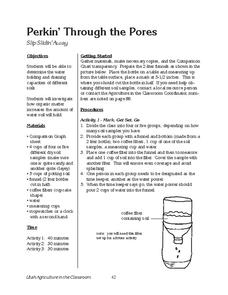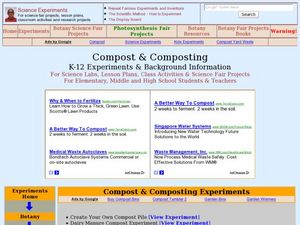Curated OER
Investigation 3 - Weathering
Fourth graders study 4 types of weather processes: wind, running water, plant growth, and freezing water. They explain how the processes of weathering and erosion change and move materials that become soil. They draw diagrams...
Captain Planet Foundation
Worm Your Way Out of This
How can you provide healthy soil for your garden? Study worms, bacteria, and other microorganisms in a lesson about decomposition and organic compost. After discussing what you know about worms and watching a video, watch what worms do...
Curated OER
Organic and Inorganic Waste
Students conduct a scientific investigation about organic or inorganic waste. In this organic or inorganic waste lesson, students create a compost heap to determine the difference between inorganic and organic waste. Students record...
Curated OER
Sustainable Livestock
Students investigate healthy eating habits by researching livestock. In this food sustainability instructional activity, students research the negative impact factory farming has on our environment due to pollution. Students define...
Safe Drinking Water Foundation
Demonstration of Water Pollution
In this teacher-led demonstration, your young environmentalists will observe and record how different types of water pollutants look when they are combined. From here, individuals will develop a hypothesis on how the water can be...
Safe Drinking Water Foundation
Types of Water Pollution
In groups, young environmentalists investigate water samples that are contaminated with different types of pollutants. Each group presents their findings to the class and fills out the "Types of Pollutants Chart." This lesson is meant...
Curated OER
"Lettuce" Learn About the Water Cycle
Young scientists investigate the water cycle through a lettuce seed experiment. For this experiment, learners plant lettuce seeds inside of a ziplock bag in order to create a small greenhouse. They observe condensation and precipitation,...
NASA
Is It Alive?
Determining whether or not something is living can be more difficult than it seems. Put your young scientists to work defining their own criteria to identify life, then work with three samples to see if they are alive or not.
Curated OER
It's Just Dirt
Young scholars discover how seed germination varies according to the soil type. In this soil science lesson, students discuss what plants need in order to grow and investigate various types of soil. Young scholars use their senses to...
Curated OER
Pollution
Young ecologists investigate some of the many ways that human activities adversely affect the environment. After identifying the main types of pollution (air, water, soil), 3rd graders fill in a Venn Diagram by pasting cut-out pictures...
Curated OER
Rocks and Minerals
Review the difference between rocks and minerals using this resource. Learners identify and investigate the physical properties of these objects. They create a Venn diagram to compare and contrast types of rocks. This is a motivating way...
Curated OER
Earth: Our Big Blue Marble
Students investigate Earth and its resources. In this Earth, space, and nature lesson plan, students collaborate to design presentations on the Earth, its cycles, and how humans have impacted the planet. Images, diagrams, and background...
Curated OER
Plants Need Soil
Third graders identify what plants need to grow. In this agricultural lesson, 3rd graders read the book The Empty Pot and discuss the steps to take when planting a seed. Students plant a seed and water it each day. Students discuss their...
Curated OER
Digging the Earth's Crust
Students investigate the Earth's crust. For this geology lesson, students identify the materials made up of the Earth's crust and investigate the different kinds of soil.
Curated OER
Perkin' Through the Pores
Students investigate how organic matter increases the amount of water soil will hold. In this water soil lesson plan, students use soil and measure water amounts using organic matter. Students measure the water holding capacities.
Curated OER
Plant Needs
Learners explore the needs of plants. In this plants biology lesson plan, students work in groups to perform an experiment with tomato plants. Each group records observations in a journal, takes pictures, and interprets the results of...
Curated OER
Compost and Composting Experiments
Students investigate the composting process through a variety of experiments. In this ecology lesson, students discuss the benefits of composting. They examine how compost affect plant growth.
Curated OER
Erosion Mountain
Students investigate the erosive impact of water. In this erosion activity, students research the impact of water on terraced and non-terraced hillsides. Students create an erosion model to have a hands-on experience with the soil.
Curated OER
Making Regolith
You may not be able to take a field trip to the moon, but that doesn't mean your class can't study moon rocks. Using graham crackers as the moon's bedrock and powdered donuts as micrometeorites, young scientists simulate the creation of...
Curated OER
Trees and Erosion
Students examine the connection between trees and erosion. For this erosion lesson students experiment with the effects of rain on a hillside. Students investigate the number of trees and the amount of erosion.
Space Awareness
Water is a Heat Sink
One of the key objectives of Europe's Copernicus Earth program is to monitor the temperatures of the oceans and seas on Earth. Young scholars learn the effects of different heat capacities through two experiments. These experiments...
Curated OER
What is Air?
Young scholars investigate air by participating in a class experiment. In this matter measurement lesson plan, students identify air as a gas which consists of mass. Young scholars utilize a windsock or balloon to measure oxygen and...
Curated OER
Characteristics of Living Things
Student use the scientific method to experiment with worms. In this characteristics of living things lesson, students predict and examine the reactions of worms to dry and wet soil. Students share their findings.
Curated OER
The Dirt on Worms!
Fourth graders make predictions, observe, collect and record data. They investigate several soil and worm websites. Finally, 4th graders write a letter to The President which defends earthworms by explaining their value to the United...

























